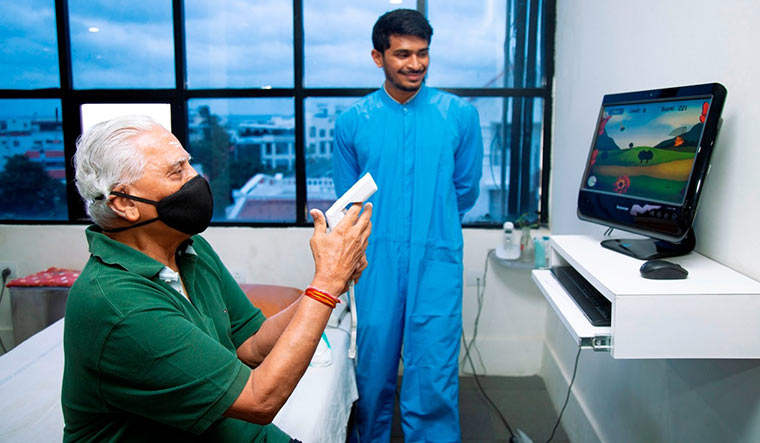Some years ago, Hyderabad resident Krishna Mohan was diagnosed with a lung condition that required immediate medical attention. He underwent treatment at a leading hospital and was subsequently discharged. However, the family was instructed to install an oxygen cylinder at home just in case. Soon, he was diagnosed with a failing liver and, once again, got treatment and was discharged. His family was asked to monitor his health closely. They turned one of their rooms into a makeshift nursing ward, hiring nurses and taking turns caring for the patient. This placed a significant strain on both their mental and financial wellbeing.
Today, if faced with the same situation, a family could handle it differently. They could consider transitional care centres, which are slowly becoming a crucial part of the Indian health care system. Transitional care comes into play when patients no longer require acute medical care in hospitals, but still need rehabilitation or ongoing treatment.
Although still relatively scarce, established transitional care centers can be found in cities like Hyderabad, Delhi, Mumbai and Bengaluru. And though awareness of transitional care remains low in India compared with the west, the number of patients and available beds are steadily rising. The patients typically admitted to these centres include those who suffer from cancer, stroke, orthopaedic problems, long Covid and cardiac ailments.
Ucchvas, based in Hyderabad, is one of the leading transitional care providers in the country. Since its establishment in 2018, the organisation has treated more than 2,000 patients and has 65 beds at its two centres. Ucchvas received positive reviews for its work during the pandemic and, with high occupancy rates at both centres, it is planning to expand.
One of the patients at Ucchvas was Masoom Pasha, who had a stroke. After receiving necessary treatment, he was transferred to Ucchvas for rehabilitation, where he received care from a speech specialist and others. After nearly three weeks, his wife, Nusrath, is optimistic about his recovery.
Families often find that the therapy and treatment at transitional care centres make a significant difference and instil confidence in patients. The affordability factor also works in favour of these centers. Said Dr Ambati Rampapa Rao, founder-chairman of Ucchvas Transitional Care: “When I established the centre, I aimed to ensure that patients do not spend more than 25 per cent of what they would at a private hospital. I am pleased that we have kept the costs lower than that.”
Rao, an anaesthetist, conceived the idea after some friends in the medical field found it increasingly challenging to monitor and prevent morbidity and death post-hospitalisation.
Upon a patient's arrival at Ucchvas, a treatment protocol is designed based on their condition, which might require multiple specialists and personalised care. Rao noted that patients typically stay at the centre for weeks, and in some cases, even months.
The centre also employs best practices and innovations to facilitate better patient recovery. For instance, recovery mapping helps develop more effective rehab therapy models using datasets, and plateau stage tapping is applied to predict and prevent progress stagnation. Considering patients' mental health, recreational therapy sessions are also offered.
Brinnova Transitional Care and Rehabilitation Centre is another well-known brand in Hyderabad, founded by doctors M.V. Sumanth Reddy and Pavan Reddy, who previously worked in corporate hospitals. “In some hospital rooms, you do not even see windows,” said Sumanth. “We made sure every room has ventilation so that patients do not feel suffocated. We ensured that there are no steps near bathrooms for patient safety.” Brinnova operates two centres in Hyderabad, with 100 beds, and is beginning to attract patients from various parts of the country.
In a typical transitional care setting, patients have access to multiple specialists, including psychologists, and necessary help to address mental health concerns that cannot be taken care of at home.
Pavan also underscored the role of a family member, who must be with the patient, as they play a crucial role in the recovery process. “Here, the family role is almost 50 per cent,” he said. “For example, in accident cases, we often encounter alcoholics. Having family around helps them cope with withdrawal symptoms.”
The primary challenge faced by transitional care providers is the lack of recognition by insurance companies. In India, those admitted as in-patients typically have to pay out of pocket because insurance companies fail to categorise transitional care as hospitalisation. Another challenge is finding space as increasing real estate prices in cities have pushed back efforts to start more facilities. Industry stakeholders also believe that the government should introduce policies and programmes to boost their services.
Rao said India needed more transitional care centres because of the growing population of elderly adults. According to various research reports, the transitional care management industry is growing at 17 per cent annually worldwide. And though many people in India see it as just another hospital, these centres have a unique identity and purpose.


